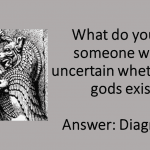I debated what would be best each time I watched part of the season-long Doctor Who story “Flux.” In the end I decided to blog about the whole all at once. The season combined the episodic multi-part storytelling of the classic show with the focus on season-long arc in the more recent series. It combined the recently-revived focus on the Doctor’s mysterious past that was such a focus particularly in the Sylvester McCoy era and its Cartmel Masterplan, but with earlier connections present in the show’s original concept and in the episode “The Brain of Morbius” from the Tom Baker era.
When it became clear that a major crux of the Flux (sorry not sorry) was a temple, the Temple of Atropos, it also became clear that this story would be really interesting for people like me who study religion on Doctor Who. Swarm says in part 3, “Once Upon, Time”:
Here we are, still engaged in the Founding Conflict. There is no greater battle than this, the battle between Time and Space. And Time shall not lose. Time shall never surrender to Space. No planetary mass, however sophisticated, can imprison the force of Time. This planet, this construction, is not just a fallacy, not just futile hubris, it is heresy.
The planet is said to be called Time and to be Division’s dirty secret. Atropos is the name of one of the Fates in Greek mythology. The Mouri who are to be found there probably derive their name from the Greek name for the Fates, Μοιραι. The fact that these were beings in Greek thought to whom all humans and even the gods were subject is worth reflecting on.
In the end we get to see Time personified, taking the form of whomever it addresses. This universe, as the show has acknowledged throughout its history, is full of gods, and in order to wring more order out of the universe or extend existence as we know it, we sentient beings regularly come up with convoluted attempts to control these powerful divine and quasi-divine forces and entities. The show regularly focuses on actions of hubris, while showing that the Doctor’s efforts to save everyone she can is also an expression of hubris. Swarm asks pointedly why fighting to delay the end of life, the universe, and everything is better than allowing Time to do what it will, when it will. This highlights something about religion that Doctor Who gives expression to: we are at the whim of forces we cannot control, and yet we weave stories to reassure us that either we can influence them (e.g. through prayers and sacrifices) or they are benevolent or at least controlled by an ultimate benevolence. Yet another approach is to accept our own inability in the face of the divine, the transcendent, the powerful.
Life as we find it worth living seems to strike a balance between humble submission and courageous disobedience, between passive acquiescence and desperate attempts to control or at least influence. As in Taoism, it is when one loses the balance between the two that things are awry.
When Swarm says that what he wants is to “reign in hell” he is quoting a line from Milton (one that also makes an appearance in the classic Star Trek episode “Space Seed”).
I wonder about Chris Chibnall’s decision on the one hand to bring back Tecteun as founder of Division only to have her killed off rather quickly, and have the Doctor recover the fob watch with her lost memories only to entrust it to the TARDIS to keep from her ‘unless she really asks for it.’ Creating mystery again has usually served Doctor Who well, and enigmas cannot be spun out effectively indefinitely. Choosing what to resolve before handing over the reigns and what to leave open must be difficult.
I also wonder whether Tecteun was one of the two time lords censured by Rassilon and indicated to be the Doctor’s mother in “The End of Time.” Could all of this be woven together into a coherent storyline?
Another line of religious significance given where it ultimately derives from is when Dan says “O ye of little faith” in part 5, “Survivors of the Flux.” I also want to mention this great bit of dialogue from part 3:
CYBERMAN: Love is not a mission. Love is an emotion. Emotions are not missions.
BEL: And that’s why you’re dead on floor, and I put you there. (shoots it again) Love is the only mission, idiot…
Ultimately “Flux” did what Doctor Who has had a propensity for doing lately: many of the Doctor’s classic enemies are involved as are lots of past allies, yet the “big baddie” is someone new; the whole universe is at stake but the Doctor saves everything quite quickly and neatly; and the result is a convoluted story resolved by the end which nonetheless feels emotionally satisfying against all odds. I’ve sometime thought it would be interesting to have a series of books on the theologies of fictional worlds. What would it be like if the universe really could be threatened as easily as the show depicts? The storytelling reflects our own contemporary awareness that our own existence as individuals and a species hangs by a threat, stands poised on a knife-edge balanced between survival and obliteration. Thus Doctor Who does what mythology and religion have always done: turned our sense of our place in the universe into stories that don’t always make logical sense because their point is not to narrate historical fact but to encapsulate and embody a worldview in narrative expression. Doctor Who does that quite effectively, and as such deserves close study in its own right as a form of (or at least a phenomenon akin to) religion and mythology.
Doctor Who isn’t going with a Christmas special this year. It will return with a New Year’s special and two more specials after that in 2022 (further details yet to be revealed). In the last of those, Jodie Whitaker will apparently pass the baton to someone else. She has been a compelling Doctor and I’ll be sorry to see her go.
What are your thoughts about “Flux”?













